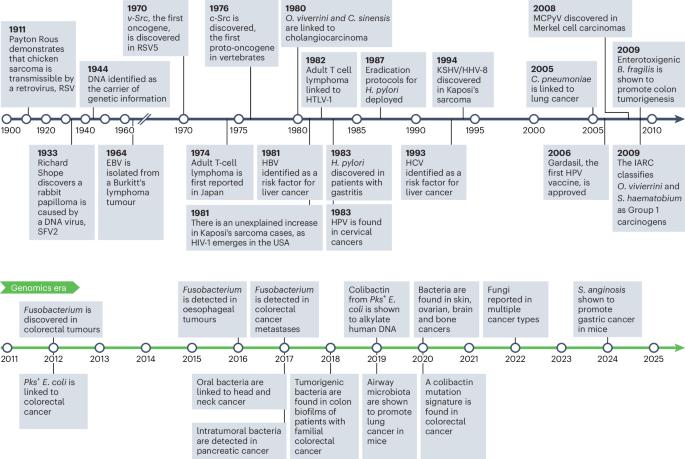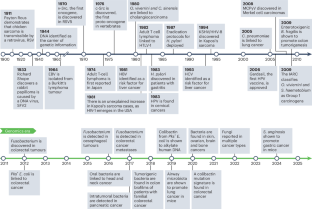The multi-kingdom cancer microbiome
IF 19.4
1区 生物学
Q1 MICROBIOLOGY
引用次数: 0
Abstract
Microbial influence on cancer development and therapeutic response is a growing area of cancer research. Although it is known that microorganisms can colonize certain tissues and contribute to tumour initiation, the use of deep sequencing technologies and computational pipelines has led to reports of multi-kingdom microbial communities in a growing list of cancer types. This has prompted discussions on the role and scope of microbial presence in cancer, while raising the possibility of microbiome-based diagnostic, prognostic and therapeutic tools. However, additional investigation and thorough validation of cancer microbiome findings are required before this translational potential can be realized. Here we provide historical context and a conceptual framework for the so-called cancer microbiome and summarize experimental studies into tumour-associated bacteria, fungi and other microorganisms. We also discuss the current evidence for microbial colonization of tumours and their varied influence on the disease, including recent debates. Finally, we consider outstanding questions and discuss our outlook for the field. This Review discusses what comprises the ‘cancer microbiome’, summarizing the studies on tumour-associated microbes, examining the evidence and assessing their impact on the disease.


多领域癌症微生物群
微生物对癌症发展和治疗反应的影响是癌症研究的一个新兴领域。虽然已知微生物可以定殖于某些组织并有助于肿瘤的发生,但深度测序技术和计算管道的使用已经导致在越来越多的癌症类型中发现多界微生物群落的报道。这引发了关于微生物在癌症中的作用和范围的讨论,同时提高了基于微生物组的诊断、预后和治疗工具的可能性。然而,在实现这种转化潜力之前,还需要对癌症微生物组的发现进行进一步的调查和彻底的验证。在这里,我们提供了所谓的癌症微生物组的历史背景和概念框架,并总结了肿瘤相关细菌,真菌和其他微生物的实验研究。我们还讨论了微生物定植肿瘤的现有证据及其对疾病的各种影响,包括最近的辩论。最后,我们考虑了突出的问题,并讨论了我们对该领域的展望。
本文章由计算机程序翻译,如有差异,请以英文原文为准。
求助全文
约1分钟内获得全文
求助全文
来源期刊

Nature Microbiology
Immunology and Microbiology-Microbiology
CiteScore
44.40
自引率
1.10%
发文量
226
期刊介绍:
Nature Microbiology aims to cover a comprehensive range of topics related to microorganisms. This includes:
Evolution: The journal is interested in exploring the evolutionary aspects of microorganisms. This may include research on their genetic diversity, adaptation, and speciation over time.
Physiology and cell biology: Nature Microbiology seeks to understand the functions and characteristics of microorganisms at the cellular and physiological levels. This may involve studying their metabolism, growth patterns, and cellular processes.
Interactions: The journal focuses on the interactions microorganisms have with each other, as well as their interactions with hosts or the environment. This encompasses investigations into microbial communities, symbiotic relationships, and microbial responses to different environments.
Societal significance: Nature Microbiology recognizes the societal impact of microorganisms and welcomes studies that explore their practical applications. This may include research on microbial diseases, biotechnology, or environmental remediation.
In summary, Nature Microbiology is interested in research related to the evolution, physiology and cell biology of microorganisms, their interactions, and their societal relevance.
 求助内容:
求助内容: 应助结果提醒方式:
应助结果提醒方式:


